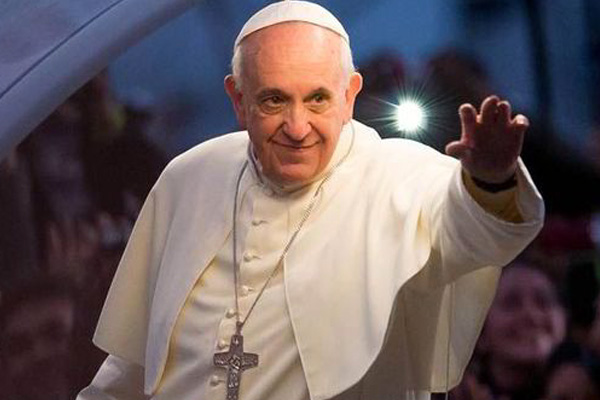
Pope Francis clarifies his “punch” line about Charlie Hebdo
- By Alison Lesley --
- 20 Jan 2015 --

Pope Francis received immense backlash after he claimed that freedom of speech ought to be limited in regards to religion, and he had to clarify his overly casual comment.
Pope Francis had to explain one of his more casual comments after it received an explosion of backlash. Speaking to reporters on his return trip from the Philippines, he addressed the “punch” line he delivered last week. In regards to the Charlie Hebdo incident, the Pope had commented that there “is a limit” to free speech when it comes to insulting people’s faith.
When asked to clarify his statement, the Pontiff restated that he was not in any way justifying violence when he said a friend who cursed his mother could expect a retaliatory punch, explaining that he was only expressing a very human response to a provocation and that greater prudence was necessary to avoid such offense. Pope Francis clarified, “In theory we can say a violent reaction to an offense or provocation isn’t a good thing, that one shouldn’t do it. In theory we can say what Gospel says, that we should turn the other cheek. In theory we can say that we have the freedom to express ourselves, but we are human, and there is prudence, which is a virtue of human coexistence. I cannot insult or provoke someone continually because I risk making him angry.”
Pope Francis originally stirred the controversy which culminated in a massive snowball of rebuttals from the internet, media, and popular world leaders over his comments about the freedom of speech and its consequences when it comes to religion. He was answering a question regarding the Charlie Hebdo attack in France. While referring to them as “provocateurs”, Pope Francis, apparently not expecting the magnitude of backlash he received over the weekend, implied that the late Charlie Hebdo satirists (who were massacred by 2 gun men for repeatedly publishing caricatures of the Prophet Mohammed) should have expected a violent response. The Pope suggested that there should be an limit to freedom of speech when it insults someone’s faith.
The Pope, who has once been a target of the magazine’s satirists in a cartoon that portrayed him as a prostitute at the Rio carnival, described a small scenario to explain his thoughts. Making reference to Alberto Gasparri , his assistant and friend, who was standing beside him, he said: “If my good friend Dr. Gasparri says a curse word against my mother, he can expect a punch,” pretending to throw a jab. “It’s normal. You cannot provoke. You cannot insult the faith of others. You cannot make fun of the faith of others.”
Someone just called me rude names. According to the Pope, that means I can punch them. Right? Or is that only OK if they criticise my faith?
— Jodie Ginsberg (@jodieginsberg) January 15, 2015
Though insisting that it was an “aberration” to kill in the name of God, adding that religion can never be used to justify violence, the Pontiff went on to say that “there are so many people who speak badly about religions or other religions, who make fun of them, who make a game out of the religions of others. They are provocateurs, and what happens to them is what would happen to Dr. Gasparri if he says a curse word against my mother. There is a limit.”
Prominent among the disagreeing voices is that of British Prime Minister, David Cameron, who defended the actions of the slain cartoonists, saying that there is a right to freedom of speech even when it is offensive to others’ religious beliefs. In a Sunday interview on CBS’s Face the Nation, Cameron said the West must show that its values, like free speech, are stronger than those of Islamist extremists creating a “poisonous death cult narrative.”
“I think in a free society, there is a right to cause offense about someone’s religion. I’m a Christian. If someone says something offensive about Jesus, I might find that offensive but in a free society I don’t have a right to wreak my vengeance upon them.” Cameron continued, “We have to accept that newspapers, magazines can publish things that are offensive to some as long as it’s within the law.”
The dust raised by the confusion from Pope Francis’ comments drives home the point that his often humor-laden casual comments, which is a core nature of the Pontiff that sometimes creates mountains out of molehills.




















